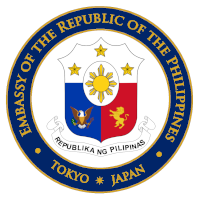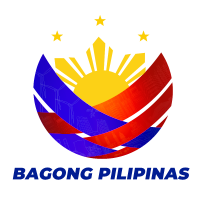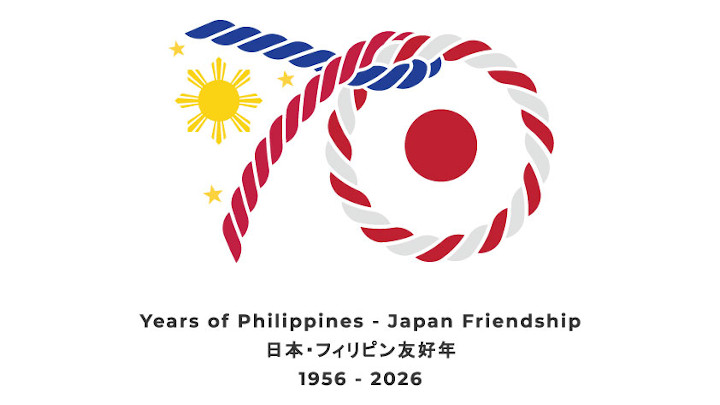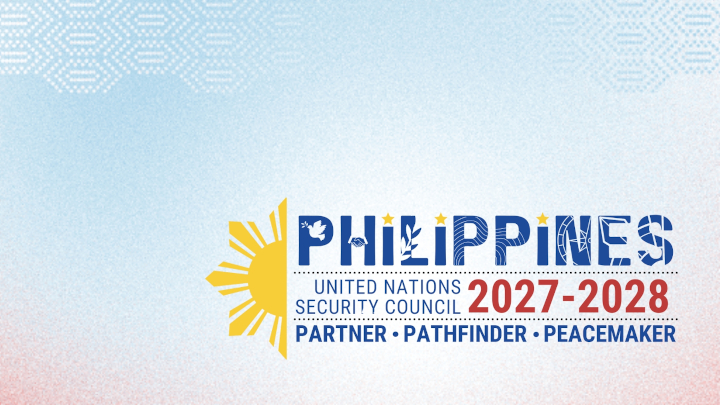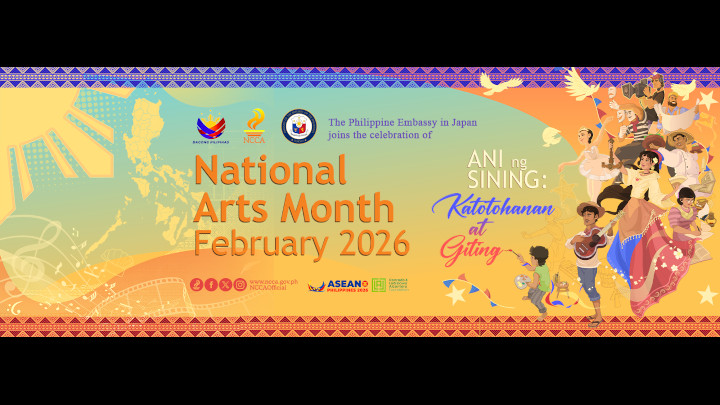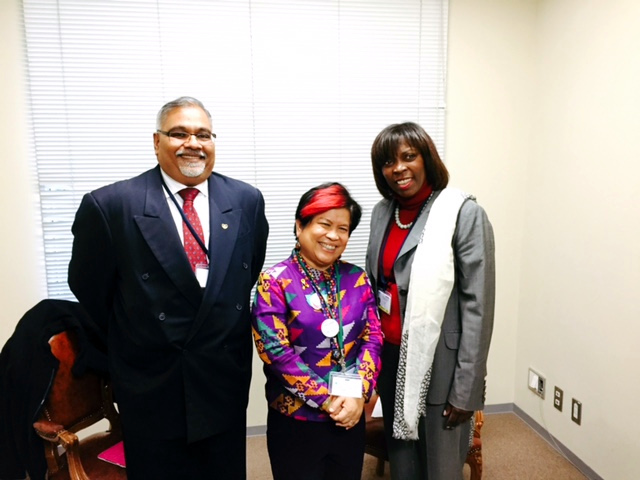DSWD Secretary Soliman and WFP Executive Director Cousin Discuss Opportunities for Enhanced Partnership of the Philippines and WFP on Disaster Risk Reduction and Support for Central Mindanao
 14 March 2015 – Social Welfare and Development Secretary Corazon “Dinky” Soliman and Ms. Ertharin Cousin, Executive Director of the World Food Programme (WFP) (photo left) today explored ways to further enhance the partnership of the Philippines and the WFP in disaster preparedness and support for communities in Central Mindanao.
14 March 2015 – Social Welfare and Development Secretary Corazon “Dinky” Soliman and Ms. Ertharin Cousin, Executive Director of the World Food Programme (WFP) (photo left) today explored ways to further enhance the partnership of the Philippines and the WFP in disaster preparedness and support for communities in Central Mindanao.
Secretary Soliman held talks with Ms. Cousin in the sidelines of the 3rd United Nations World Conference on Disaster Risk Reduction (3WCDRR being held from 14-18 March 2015 at the Sendai Conference Center, Sendai, Miyagi Prefecture, Japan. Secretary Soliman is Head of the Philippine Delegation to the 3WCDRR and co-chairs with Ms. Cousin the Working Session on Preparedness for Effective Response.
 Secretary Soliman conveyed to Ms. Cousin the appreciation of the Philippines for the support of the WFP to programs in conflict-affected areas in Mindanao and the immediate and ready assistance during Typhoons Haiyan (Yolanda) and Hagupit (Ruby). In response to the destruction caused by Typhoon Yolanda in Central Visayas in November 2013, the WPF gave food and cash benefiting over 2.9 million Filipinos including 95,000 children and transported humanitarian cargo totaling 27,730 cubic meters on behalf of 39 different humanitarian organizations.
Secretary Soliman conveyed to Ms. Cousin the appreciation of the Philippines for the support of the WFP to programs in conflict-affected areas in Mindanao and the immediate and ready assistance during Typhoons Haiyan (Yolanda) and Hagupit (Ruby). In response to the destruction caused by Typhoon Yolanda in Central Visayas in November 2013, the WPF gave food and cash benefiting over 2.9 million Filipinos including 95,000 children and transported humanitarian cargo totaling 27,730 cubic meters on behalf of 39 different humanitarian organizations.
The WFP also distributed High Energy Biscuits in the early phase of the emergency including the Plumpy’Doz, a peanut – based specialized product to prevent acute malnutrition, to younger children aged 6-23 months. It launched cash transfers through NGO partners in early December 2013 for a two-month period targeting 85,000 people in Northern Cebu and Northeastern Panay Island.
On top of the regular Pantawid, WFP also provided emergency cash assistance of PHP 1,300 or USD 30 per family per month to 101,038 Pantawid beneficiaries in Region VI and VIII. In sum, the WFP provided a total of PHP 262,438,800 (more or less USD 6 million) to the Pantawid beneficiaries from November 2013 to October 2014.
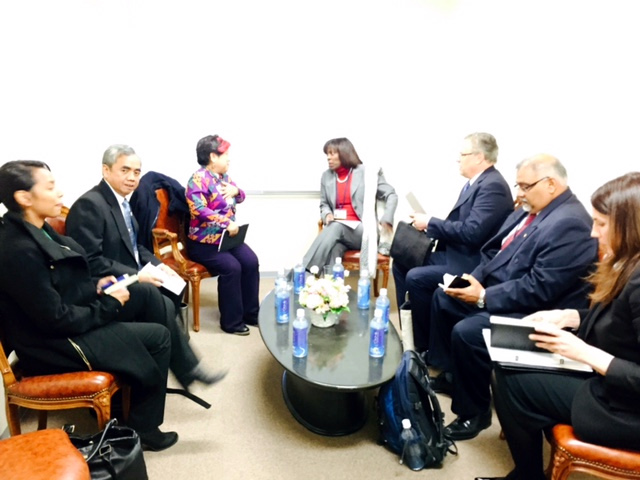 At the bilateral talks joined by members of the Philippine Delegation to the 3WCDRR, Secretary Soliman acknowledged the support of the WFP for the Philippine Government and for recognizing the strong leadership of the Government for disaster risk reduction (DRR) and preparedness. In line with DRR, Secretary Soliman informed the WFP Executive Director of the advances made in the preparedness program of the National Relief Operations Center and the launch last Tuesday of the Capacity Enhancement Program for DSWD and the Office of Civil Defense.
At the bilateral talks joined by members of the Philippine Delegation to the 3WCDRR, Secretary Soliman acknowledged the support of the WFP for the Philippine Government and for recognizing the strong leadership of the Government for disaster risk reduction (DRR) and preparedness. In line with DRR, Secretary Soliman informed the WFP Executive Director of the advances made in the preparedness program of the National Relief Operations Center and the launch last Tuesday of the Capacity Enhancement Program for DSWD and the Office of Civil Defense.
On the conflict-affected areas in Mindanao, Secretary Soliman and Ms. Cousin discussed the partnership of the DSWD with the local government units and the WFP in rebuilding of lives of the returning communities and implements different program to ensure that poor, vulnerable and displaced Filipinos receive adequate access to food and nutrition during the critical transition period from relief to recovery. The DSWD Secretary explored ways to enhance the current WFP assistance in Central Mindanao specifically the school feeding program that provides hot, nutritious meals to elementary school children in the conflict areas targeting 100,000 children in 350 schools; the Food- and Cash-for-Assets Program that empowers communities and promotes self-sufficiency through Food/Cash-for-Work and Food/Cash-for-Training; and nutrition support for young children and women to them the opportunity to reach their full growth and development potential.
In the context of the 3WCDRR, Secretary Soliman and Executive Director Cousin discussed opportunities for enhanced partnership with the WFP on DRR noting that the Philippines is a highly disaster-prone country with an average of 20 typhoons a year, and is exposed to other natural hazards such as earthquakes, floods, volcanic eruptions and drought.
Secretary Soliman noted that WFP Philippines supports national and local government efforts to effectively and efficiently prepare for and respond to natural disasters by implementing various projects in selected highly disaster-prone provinces. The WFP is also supporting the government where emergency responses are needed. The DSWD and WFP are implementing a project to enhance the capacity of communities and key government agencies (DILG, DSWD and OCD) on disaster preparedness and response.
Executive Director Cousin updated Secretary Soliman on WFP innovative projects such as the Mobile Phone-based Cash Transfer, a first for WFP in Southeast Asia, that allows cash disbursements by sending a text message to Cash-for-Work programme beneficiaries; and the Micronutrient Powder and Fortified Ready-to-Use Food for children aged 6-24 months to help reduce the prevalence of anemia and other micronutrient deficiencies. WFP has also initiated the development of fortified ready-to-use food locally for children and women in the Philippines.
Joining the WFP Executive Director in the meeting was Mr. Praveen Agrawal of the WFP Philippines (photo below). END
